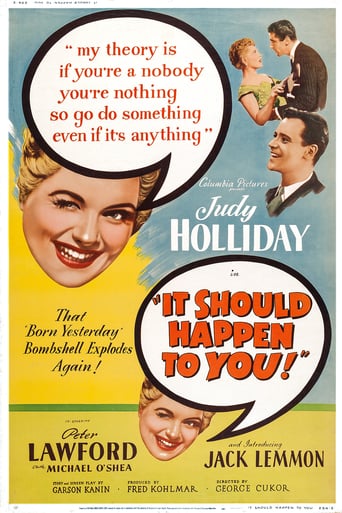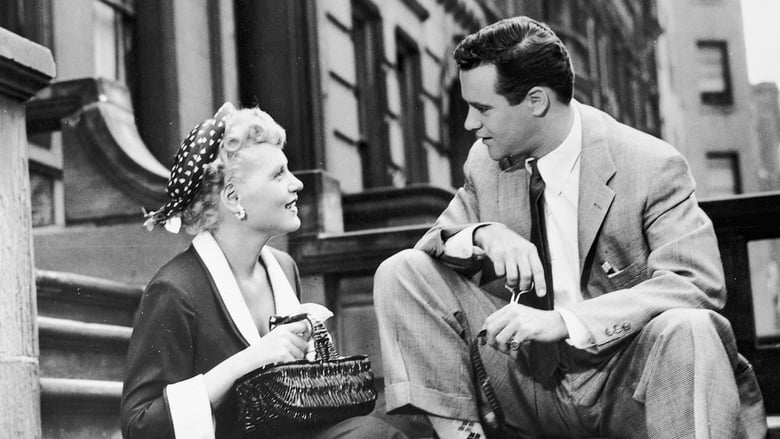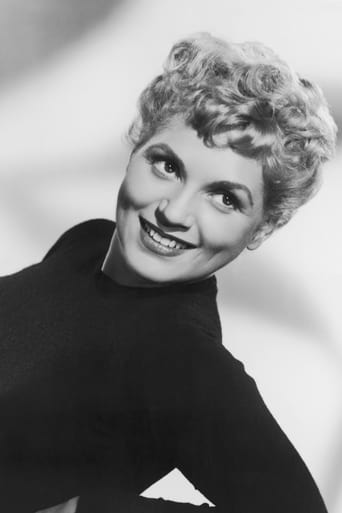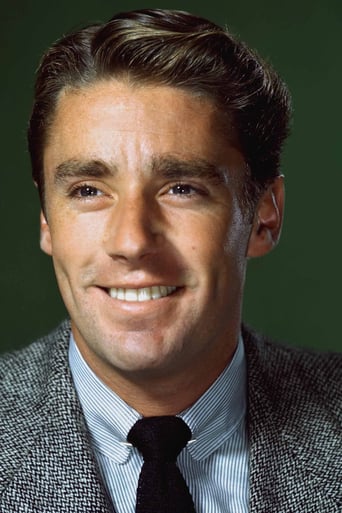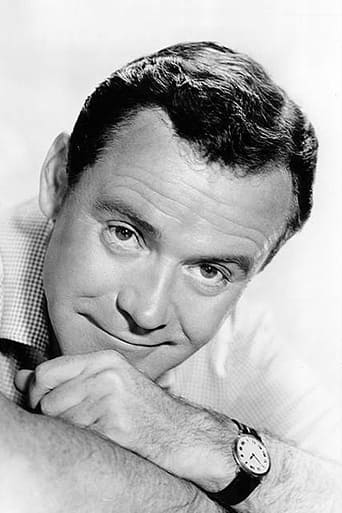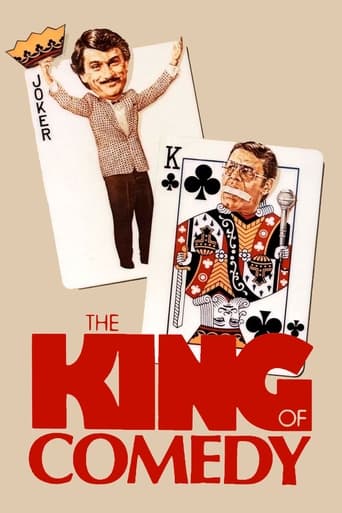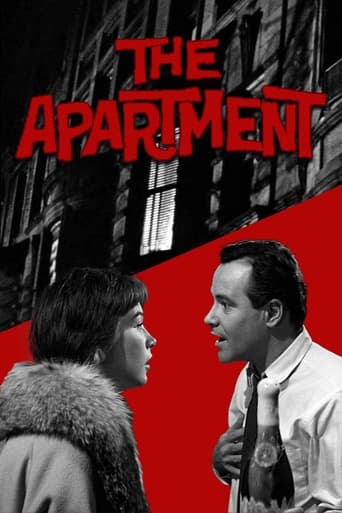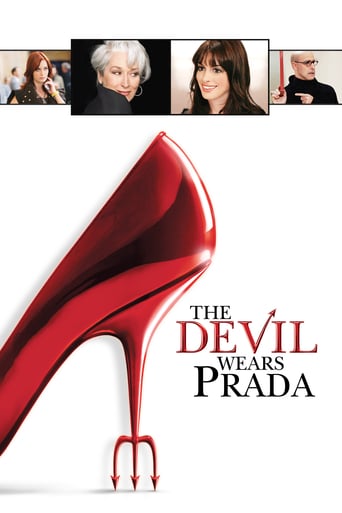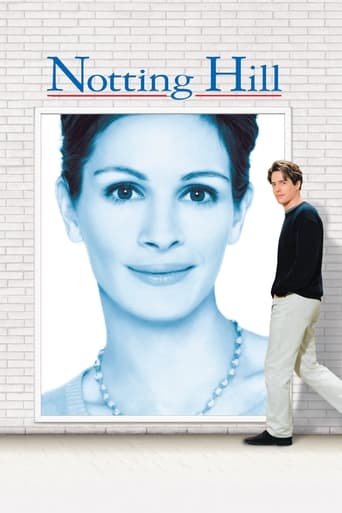It Should Happen to You (1954)
Gladys Glover has just lost her modeling job when she meets filmmaker Pete Sheppard shooting a documentary in Central Park. For Pete it's love at first sight, but Gladys has her mind on other things, making a name for herself. Through a fluke of advertising she winds up with her name plastered over 10 billboards throughout city.
Watch Trailer
Cast


Similar titles
Reviews
Aspiring model comes to New York and concocts a novel idea to advertise herself - her name on billboards. This is a pleasant little comedy that benefits tremendously from the presence of Holliday. In fact, she's the whole show as the kooky blonde named Gladys Glover, a simple, good-hearted young lady who revels in her 15 minutes of fame. It is lamentable that the actress had such a brief career before her untimely death. Lemmon makes his film debut here, establishing the sensitive, hyperactive good-guy persona that he would go on to play variations of pretty much throughout his career. This was the last of a half-dozen films that Kanin and Cukor collaborated on.
It's sad that Judy Holliday made so few movies before dying very prematurely in 1965. She had a marvelous screen presence--earthy but extremely likable. Here, as usual, she is in top form as the sweet but ditsy Gladys Glover. However, unlike several of her other films, this one featured a supporting performance that was so well done that for once, my attention was not just on Holliday. Jack Lemmon is here in his first film and he is marvelous as well. This is NOT in the same way as Holliday, but as a sweet everyman sort of character--one that actually improved the film tremendously. Together, they were better than any of Holliday's other films. Teaming her with talented actors such as William Holden ("Born Yesterday"), Dean Martin ("The Bells Are Ringing") and Aldo Ray ("The Marrying Kind") worked fine--but the Lemmon-Holliday teaming was perfect.The film begins with Holliday and Lemmon meeting in Central Park. She has just lost her job and he is a struggling documentary film maker getting shots for his next film. They begin to talk and it's obvious that there is some lovely chemistry between the characters. You really, really like the two and want to see them fall in love. And, so it would appear until something weird happened. On a lark, Holliday buys billboard space on which she simply has her name written. At first, nothing comes of it, but soon a lot of unexpected publicity results and Holliday becomes an instant star. While this would seem great, it drives a wedge between her and Lemmon. I liked this, as in some other romantic comedies, the guy is a jerk who just doesn't understand. In this case, your heart breaks for Lemmon, as he is wronged repeatedly as Holliday's attention is taken away from this sweet guy. For example, you can't help but feel for the shmoe when she blows off their date--their date to meet his parents! Can Judy get her head on straight and realize that there is more to life than publicity and notoriety? Or, will she lose the man in her life who is worth having? See this film and find out for yourself.There is a lot to love about about the film. The acting is first-rate, the writing is perhaps even better (if it's possible) and this little film packs an amazing punch. Sweet, memorable and perhaps Holliday's best--this is a great example of simple and highly effective film making. Not to be missed!
While the performances in this film certainly had their good moments, none of the characters were particularly likable.Jack Lemmon's Pete is manipulative and casually sexist, trying to bring Judy Holliday's character Gladys down to earth, basically dangling that holy grail of marriage just past her fingers, but saying that he would not offer it, or take her seriously, until she behaved herself like a good girl. She says to him, "don't be the one to burst my bubble", but he takes no notice and is petulant and possessive.Then again though, those dreams Gladys has- just to be known, not for anything at all, just KNOWN. They aren't very noble dreams. It's good that she wants her autonomy, but she plays the dumb blonde shtick and comes across as irritating, vacuous and greedy, and is soon exploited by unscrupulous, slimy businessmen. I think there's an intended message here that women couldn't hope to win in the 1950s and they were silly to even try.But it was Peter Lawford's character that was the worst. As the rich owner of a soap manufacturing company, he's practically psychopathic. I don't know how anyone could have interpreted his advances towards Gladys as romantic or warm. He's a man who won't take no for an answer. The scene where he follows Gladys into her home despite her saying goodbye numerous times made me very uncomfortable- many women will recognise that situation, where you don't want to be rude and so the man takes advantage of your politeness and pushes his luck despite understanding full well that he's not welcome. The scene in his apartment where she expects a business meeting and he expects her to prostitute herself makes me even more uncomfortable. You can see the fear on Gladys' face as she cringes away from his kisses (a good performance there from Holliday) and there are definite undertones of rape. It made me feel sick. Without the Hays Code restricting what could be shown and said, imagine that scene played more explicitly today- you would not be able to consider the film a comedy.The ending of the film is supposed to be happy but I think it's rather a tragedy. Gladys and Pete, newly married, are in his car. Even from the brief scene it is made clear that she's been broken into submission. He makes all the decisions- we'll find a motel and go straight to bed, and then get back on the road early- and with a faint voice she asks if they couldn't possibly have breakfast before they leave. Yes, she's a good girl now.
Judy Holliday struck gold in 1950 withe George Cukor's film version of "Born Yesterday," and from that point forward, her career consisted of trying to find material good enough to allow her to strike gold again.It never happened. In "It Should Happen to You" (I can't think of a blander title, by the way), Holliday does yet one more variation on the dumb blonde who's maybe not so dumb after all, but everything about this movie feels warmed over and half hearted. Even Jack Lemmon, in what I believe was his first film role, can't muster up enough energy to enliven this recycled comedy. The audience knows how the movie will end virtually from the beginning, so mostly it just sits around waiting for the film to catch up.Maybe if you're enamored of Holliday you'll enjoy this; otherwise I wouldn't bother.Grade: C

